It’s not long until April 10th. I have to keep telling myself that.
So what do you think? Looking good?
It’s not long until April 10th. I have to keep telling myself that.
So what do you think? Looking good?
 Hot on the heels of yesterday’s Ant-Man trailer launch, Marvel have now finalised the launch date for the Daredevil TV series.
Hot on the heels of yesterday’s Ant-Man trailer launch, Marvel have now finalised the launch date for the Daredevil TV series.
That’s right Marvelites, Season 1 of “Marvel’s Daredevil” will premiere with 13 one-hour episodes on April 10, 2015 at 12:01 a.m. PT in all territories where Netflix is available.
Now this is interesting from an Australian viewpoint: Netflix launches here in March, so in theory we should have access to Daredevil from the time it launches, unless the rights had already been signed away to another company prior to that.
As for the show itself, I’m encouraged by the small snippets I’ve seen so far. DD is my favourite Marvel character (it’s the only Marvel title I attempt to be a completist on), so like a lot of people
I’m very keen to see the show work. Agents of S.H.I.E.L.D. shows how a Marvel show can work well (albeit after some initial stumbles), so I remain hopeful for a great ride.
Personally I’m not a Netflix subscriber, but I will be if I get to see Daredevil.
What about you?
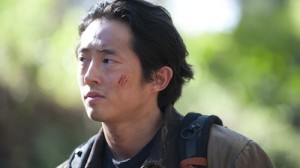 One of my favourite books of all time is Cormac McCarthy’s post-apocalyptic novel The Road. Following the story of a boy and his father as they make their way towards the ocean, it provided me with a sense of dread and despair that hasn’t been matched since, not even in its own 2009 film adaptation. Long stretches of hopelessness and misery prevail, making it an incredibly depressing and hard book to read. But every so often, McCarthy gives the characters a break, providing something incredibly small and taken for granted in the civilised world like a can of coke, and turns it into a powerful and heartwarming moment.
One of my favourite books of all time is Cormac McCarthy’s post-apocalyptic novel The Road. Following the story of a boy and his father as they make their way towards the ocean, it provided me with a sense of dread and despair that hasn’t been matched since, not even in its own 2009 film adaptation. Long stretches of hopelessness and misery prevail, making it an incredibly depressing and hard book to read. But every so often, McCarthy gives the characters a break, providing something incredibly small and taken for granted in the civilised world like a can of coke, and turns it into a powerful and heartwarming moment.
The Walking Dead, while almost certainly not operating on the same level of success, makes attempts to replicate this formula. It’s incredibly depressing and heavy in the first half of the season, especially the events in “The Grove”, broken by smaller moments – the candy bar bet and Glen and Maggie’s reunion come to mind in this weeks episode. But while the show makes a valiant effort at this juxtaposition, the multiple character trees make for a viewing whose pacing feels off.
Let’s start with one of the biggest plot points, but ultimately the least satisfying conclusion to a story arc – the Maggie and Glen reunion. What should have been a fairly large and momentous occasion feels weak and a little bit forced. That’s not the problem with the episode itself per se, nor is it with the actors themselves – it’s a matter of timing and characterisation. Over the course of the past seven episodes, their story features in three prior, so we aren’t given enough time to really feel their absence. Alongside this, Maggie and Glen aren’t given a hell of a lot of material this season outside of “we love each other”, the sole driver for their actions.
Another character who wasn’t really given a lot of characterisation over the past season was Daryl, at least until the past few episodes. Content in leaving him as a strong, loyal, rogue with a heart of gold character for much of this season, the past few episodes have really delved into what used to drive Daryl before the outbreak (traveling and doing the odd illegal job with Merle). That allowed for this episode’s team up with the gang that Rick had a run in with much more believable, with Joe stepping in as the family element that Daryl craves, albeit as more of a Merle type figure. While it will be obvious who Daryl decides to side with when they eventually meet up, it does allow for an interesting look at other dynamics that are less family focused.
While the moments of tension are welcome and a necessity in a show like this, The Walking Dead has its problems with pacing. So far the first half of the season was heavy with a fairly dark tone: the plague, Carol’s murder, and the Governor’s assault fairly relentless in execution. This second half feels less like an extended epilogue rather than a cohesive half, with a substantially lighter tone, bar last week’s fairly dark episode. It doesn’t feel like there’s a build to a proper climax that is worthy of the mid season, and while these character vignettes are welcome, the structure of the season feels off.
The Walking Dead took a larger risk this season, and risks are always welcome. I find that I harp on the show more than a lot of people, but I genuinely enjoy the fact that a show about zombies has made its way into the mainstream. The end of the world is a fantastic place, and the writers need to take more advantages and risks like this to keep the show fresh.
Besides, Terminus will get its due in the finale. Who wants to bet they are cannibals?
A couple of observations
There is nothing more terrifying than imagination in horror. Letting the audience fill in the gaps of what might have happened, rather than explicitly stating, is far more effective and ultimately more disturbing. The Walking Dead knows this – the baby carriage in “Too Far Gone” or the murder/suicide room in this week’s “Claimed” elicit a stronger emotion than any literal subject. The writers also know when to show their hand, and the reveal in “After” that baby Judith had in fact survived is a welcome one. But while “Inmates” included many reveals and hints at what to come, the intertwining storylines ultimately fell flat. In contrast, “Claimed” returns to the usual storytelling, and pulls back the scope to a smaller scale. The Walking Dead works best when it focuses on less, and these two episodes prove the shows strengths – and weaknesses.
“Inmates” splits its episode four ways, each running concurrent to the other, producing a series of vignettes. Picking up right where the midseason finale left off, it follows four separate groups as they reclaim their bearings. Beth and Daryl get the opening segment, fleeing from the prison. The sequence, while short and fairly inconsequential, is the most hopeless. Stumbling upon what they believe is the remains of the girls, they end up heading in the other direction. Both heartbreaking and frustrating, it helps to flesh out the world around them – instead of the usual everybody finding everybody by some weird television destiny, its great to see that these people won’t be finding each other anytime soon.
By far the most important sequence of the episode is the Carol/Tyrese/Girls/Judith one. Confirming the fate of Judith was welcome, but re-introducing Carol, and setting up a forward trajectory for the rest of the season was also surprising. Sanctuary comes to the forefront, and also presents an end goal for our band of heroes. Where this sequence became controversial was in its handling of Lizzie. In the shows attempts to build Lizzie as some form of psychopath, the character has seemed to found itself in a violent streak – killing rabbits and almost suffocating Judith. Look, I’m all for Lizzie to fulfill the role that was similarly brought forth in the comics, but infanticide – especially shown infanticide – is almost where I switched off. There are some lines in TV that I do not want crossed.
Regardless of content, “Inmates” doesn’t exactly impress with its storytelling. Glen’s segment starts strong with a lone survivor vibe, but when more survivors are introduced it feels like a retread of Maggie’s, which also feels weak. Beth and Daryl’s intro is marred by a melodramatic narration from Beth, and Carol’s segment would be incredibly dull without any of the reveals. “Inmates showcases that smaller and less dense stories aren’t the shows strong point.
“Claimed” returns to focusing on the 2-3 story-lines typical to the show. Rick finds himself under house invasion, with Michonne and Carl out bonding, while Glen and Tara, with newcomers Abraham, Eugene, and Rosita deciding on the next plan of attack. Bringing the focus back allows for the stories to breathe – the Michonne/Carl bonding would have felt rushed had it not had the time “Claimed” allowed it.
Abraham and Co. are given decent screen time for their debut, and they feel fully realised already. Abraham, while visually stereotyped as the macho, Rambo-esque character has a surprising amount of depth for the short time on screen, empathizing with Glen, and not even being the first punch in the subsequent fight. Eugene and Rosita aren’t given much more than a few moments screen time, but should they move on the same trajectory they could be a welcome addition to the cast.
Rick’s home invasion was the source of tension this episode, but it would have fared better had it not been interrupted constantly by the other stories. The tonal shift between Michonne/Carl’s game and the intrusion is odd, and the home invasion could have been better suited as its own standalone episode. That’s not to say the game wasn’t welcome – humanizing Michonne is some of the best moves made in the show this season – but another place and another time would have been better.
The countryside roaming wasn’t going to last forever, and as Rick finds the sign at the end of the episode, it becomes clear that all roads lead to Sanctuary. Lets just hope it doesn’t drag on like the prison.
A couple of observations
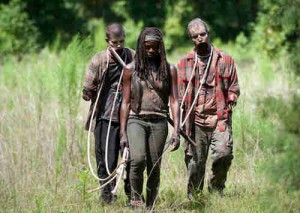 Welcome back to our weekly The Walking Dead coverage! Having missed the final episode of the midseason, I’ll be doing a brief look at that episode at the end of this review, but for now lets take a look at the midseason premiere “After”
Welcome back to our weekly The Walking Dead coverage! Having missed the final episode of the midseason, I’ll be doing a brief look at that episode at the end of this review, but for now lets take a look at the midseason premiere “After”
Following the events of “Too Far Gone” its nice to take a step back and focus on a much smaller cast. The Walking Dead often shows its strengths when dealing with only a few characters (see last seasons’ “Clear” or Season 2’s “18 Miles Out”). Allowing the viewer to get into these character’s heads following the tragedy at the prison was a smart, if not a risky choice. Training up viewers on high tension action for the first half of a season does provide a thrilling show, but it does mean that the slower moments, for better or for worse, stand out.
“After” split its focus between Michonne, and Rick and Carl, in the fallout of the prison attack. Michonne finds herself back where we found her, complete with two zombies in tow. Her storyline is the more satisfying of the two, complete with a heavy handed (albeit cool) metaphor of a similar looking zombie. The Walking Dead excels when it lets the viewer draw the comparisons, rather than the many circling conversations that the show often finds itself in, and while the fear of Michonne’s humanity failing in the face of great loss is shown in an incredibly obvious metaphor, it is not an unwelcome one.
Where her storyline really shines is in her small dream sequence, which was an eerie and surreal trip down memory lane. Shot fantastically with strange jumps in time and logic, the dream sequence is (as far as I can remember) the first time the series has gone full blown surreal, and I would not be opposed to more. We also now know that Michonne had a son, lover and an extra friend, but that’s all that writer Robert Kirkman is willing to give us. Again, stories are made all the more better when they leave some details to the audience, so for now the details about her past are left murky – and may very well stay that way.
The real meat of the episode is Carl’s brief rebellion against his father. While Rick may have been unconscious throughout much of these events, it didn’t stop Carl from letting loose his teenage angst. This act of defiance is reminiscent of a standard teenage breakout – Carl thinks he’s old enough to look after himself, especially after his father’s lack of action as a farmer last season, and the act of trying to be his own man and failing is entirely the traits of the rebellious teenager. Chandler Riggs has come a long way from the first season, and while his acting may not be perfect, he’s certainly competent enough to carry much of the episode.
These two storylines all seem to be tying back into the theme of the season – what is worth living for? Michonne obviously found it in the company of the prison group, with her life as a penitent loner far behind her. Carl’s trajectory is less apparent – he wants to be self sufficient, but until he grows both physically and emotionally, this isn’t likely to happen. His need to be a better man than his father appears to be his reason for being right now – he is his father’s son more than he cares to admit – and time will tell if somewhere down the line Carl takes Rick’s place at the head of the group.
Decent direction, coupled with some decent character moments made for a solid premiere – if not one to truly remember. It appears that The Walking Dead may be playing the slow burn for the latter half of the season, and it will remain to be seen whether or not it plays in the show’s favour.
Some observations
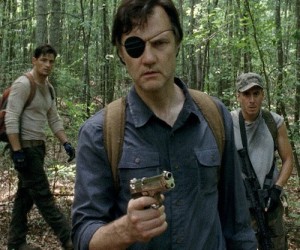 Warning: full spoilers for the episode follow
Warning: full spoilers for the episode follow
This season has had a fairly defined message that seems to plague each of the characters: how far are you willing to go – and at what cost? The Governor found himself in a position where he had pushed this notion to the limit, killing many of his own people in cold blood. “Live Bait” seemed to bring The Governor back from the brink, giving him purpose and family. But it seems that the past can’t be righted – or forgotten – as we find ourselves with a man not just where he began , but more focused and meaner.
This failed retribution story is a fascinating one, and one I wasn’t sure was going to play out. Sure we got the eye-patch reveal a few episodes back, but that could have just as easily proved to be a red herring. The Governor seems to have found his drive again – first it was revenge for his daughter and now it seems to be the protection of his new family that has forced him back into the brink. It’s an interesting theme, and one that tries to force the sympathetic villain hand, but two episodes were definitely not enough time to flesh this out. Despite the obvious time skips – and, yes, to point out this definitely would prove to be enough in universe time to have this family bring “Brian” in- it hasn’t given us enough time to care about these people at all. Not enough show, and too much tell.
That’s not to say the little moments in this episode don’t work. Brian’s initial resistance to leadership was also a great moment, particularly when he dragged Martinez kicking and screaming into the pit, yelling about how didn’t want it. Combine that with when he tried to get away from becoming leader, and was only held back, and it paints an interesting picture. The Governor knows he is somewhat deranged, and despite his best attempts to run away from this, he can’t. So the only way he knows his family is safe is when he is in charge.
Taking charge is what this man does best, and when he realises that the only way he can do so is to remove the weak pieces from the board, you see some key moments. Picking off the old leadership is smart – it’s just a shame it wasn’t handled by the writers with the same equal planning. As the old leadership is picked off one by one, there is no conceivable way that these killings would take place so that no one would notice, or that no one would question these newcomers, especially Mitch (played by early season Fringe star Kirk Acevedo, who should prove to be a good addition) who should be more upset at his brother’s death at the Governor’s hands.
In the end it seems that this was really the only logical conclusion to this two episode story arc. The writers should be commended for attempting a breakdown of a character who really hasn’t been given anything besides being a one-note villain. It’s just a shame it wasn’t given more time.
But hey, at least next week we get to see that tank in action right?
A couple of observations
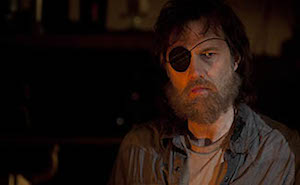 Warning: full spoilers for the episode follow
Warning: full spoilers for the episode follow
Let me preface this review by saying I think David Morissey is a fantastic actor. I love every scene he is in, and even when the writers painted him into the one-note villain he had become, I still enjoyed seeing Morissey handle the reins. He gives the show one hundred percent, and is clearly loving it, so anything I have to say about The Governor (or Brian now I guess) is purely down to the writers. Because this episode has pushed the character in a direction I didn’t think he could be taken, and because it does so in little over 42 minutes, it will have to be judged once this particular arc is over, making this a particularly hard episode to review.
When we saw The Governor last, he had killed a lot of innocent people just because they pissed him off. In most shows, this would be the point of no return, as the my-way-or-your-dead approach is a fairly reprehensible act. But the writers here have been keen on asking the “how far can you go before you lose your humanity” question for a while now, so the attempt at humanising the character once again makes sense in that regard.
That’s not to say that it is necessarily the right choice to make, but it remains to be seen whether it will pay off in the end. Too much happens in this episode to allow the viewer to accept that this a changed man – but maybe that’s the point. Maybe The Governor has gone too far that he cannot truly return to being a person who represents any form of humanity, that this brief moment of affection for a family is going to end as quickly as it started. A show usually would subtly push this character change over many seasons. Lost’s Benjamin Linus (handled by the brilliant Micheal Emerson) comes to mind, but The Walking Dead has never been particularly subtle.
As mentioned before, David Morrisey is a great actor. He handles the brooding, self punishing character well, jumping from anger as he burns down Woodbury, to an almost dead man walking before he meets with the Chalmers family. It invites a certain calibre of actor to pull off the man who is both self-flagellating and trying to move on, and his scene with Meghan explaining what had happened with Penny was fantastic. At one point I could not tell whether “Brian” was laughing or crying, and to this point I’m still not sure. It’s subtle, yet effective
The Governor’s new family were serviceable in the end. Tara’s fake bravado came off as a bit much for the actress to convey, but she calmed down towards the end of the episode, and Lily seemed to really only be there for The Governor to shack up with. Meghan was really the obvious tie to The Governor’s humanity, and while the actress had a hard time sometimes, her look was just close enough to Penny to be an overt reference to his humanity.
On the zombie front, the retirement home scene was fun and tense, and reminds me of the similar location back in the first season, and the amputee zombie in the bathtub was heartbreaking, but the herd scene at the end was my favorite zombie kill this season. Pulling the head back of the zombie was brutal and vicious, and highlighted how much The Governor cared/cares for Penny/Meghan. That’s probably no easy task to accomplish, and was excellently handled on the special effects front.
One thing that really stood out this episode was the direction. There was a lot of dream-like shots that lent themselves well to the idea that this family life may very well be only a fantasy that The Governor is living right now. The sound design in the final pit scene was great, as the sound of assault rifle fire was there but it took a while to notice them.
Any judgement of where The Governor is going will have to wait. While this episode does push the boundaries of where the writers can take this character while still making sense, it remains to be seen if it pays off. There is still at least one more episode of this standalone arc, so it will be very interesting to see how we get to the point we see him outside the prison. Lets just hope they can handle it right.
A couple of observations
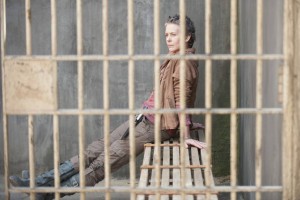 Warning: full spoilers for the episode follow
Warning: full spoilers for the episode follow
I always took Rick as the foil to Carol’s less empathetic form of leadership. It made logical sense, as she was the only other person who produced any discernible leadership qualities to date. However, after the events of “Internment” I’ve finally realized that it is in fact Hershel – who is the yin to Carol’s yang – a leader who focuses on hope and individuality, rather than the good of many.
It also helps he’s pretty badass too.
“Internment” is indeed Hershel’s show, and he holds his own very well. His insistence at keeping up morale (his “sad soul kills faster than any germ” line was a standout moment) even when everything looks at its worst is an incredibly noble moment. Living at the end of the world must be an incredibly heavy burden to bear, and less reminders of what is actually happening can serve to help rather than hinder. It is in direct contradiction to how the lack of security failed the survivors early on in the season, but it does appear that the writers are siding with Hershel this time around, in the mere fact that his deeds were rewarded with not everybody dying.
That’s not to say that he hasn’t come out unscathed – this is a man who once believed that the zombies could be saved of course, so his hesitance when forced to kill one of his patients felt natural. Also equally powerful was his speech to Rick about God’s plan, even when confronted by Caleb’s reminder that he can’t save them all, he feels this is all still a test of faith. Scott Wilson handles this all fantastically, his confident and kind manner undercut by a subtle sadness at how much work he still has to do.
Action was surprisingly prevalent for an episode based around Hershel, as we were treated to two large climactic set pieces. Rick and Carl’s fight was fairly par for the course as far as zombie mow downs go, but Hershel’s escalating action with only a handful of zombies was fantastic. Tension kept on mounting, as disaster after disaster compounded into a frantic attempt at saving anyone they could. This is punctuated by the final scene of Hershel breaking down in his own cell, acting like a father who has been strong for the people he loves, and when he is finally alone gives himself time to mourn. It was all a fantastic scenario and highlighted how, as Daryl put it, Hershel is one “tough sumbitch”.
Rick’s story was much more subdued this week, if you can call putting down a herd of zombies with automatic weapons subdued. It’s a culmination of Carol’s insistence that Rick can’t just forget the end of the world is happening, as he slowly is beginning to fall back into a position of power. As he calls his son to help kill the horde, there’s the realisation that he can’t protect his son from violence like a normal civilized society can. What he can do is remind him of those values, and the shot of the peapod juxtaposed with his pistol is a realisation of that line of thought.
One last thing that I usually leave relegated to the observations at the end of the review, is the moments where the audience is forced to suspend their disbelief, and this happens fairly regularly. It has become a bit of a joke how many dumb decisions these survivors have made. Simple things like the sick only being locked in their cell much later than they should have been, or the lack of more protection from the horde beyond a fairly poor fence line are all things that are set up to manufacture these climatic events. There isn’t any inherent problems with the events themselves – they are often exciting and well produced – it’s the journey to get there that needs to be addressed. A show shouldn’t have to force the viewer to sit down and rationalise the steps these people take, and that has been tiresome for quite some time.
Despite this problem, “Interment” really highlighted how society hasn’t failed yet, and that good things can still happen to very good people. It did border on very grim at some points, but in the end it does still leave hope for these people at the prison.
Some observations:
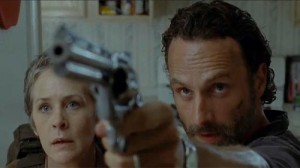 Warning: full spoilers for the episode follow
Warning: full spoilers for the episode follow
The Walking Dead has always been a show about the human aspect of the apocalypse. While it may have stumbled quite a lot in this area during its run, it has always been a soap-opera set in the zombie apocalypse – and that is a good thing. Rather than following George Romero, and turning the undead into a political statement, Robert Kirkman and team have always focused on how people react when faced with the end of the world. “Indifference” embraces this as it continues to explore of the most interesting dynamics this show has seen in a long time, and despite a less than stellar sub-plot, provides one of the slower, but probably the best episode of the season so far.
Lets get the big point out of the way – I am glad they made Carol the culprit of the Dave and Karen killings and not Lizzie. It brings much more depth to her character, and unless we find out later on that Carol was covering for her, provides a much more plausible scenario. That’s not to say that their conversation at the beginning of the episode wasn’t any less dubious – Lizzie’s mental state is obviously deteriorating, and an inability to understand that the walkers are in fact dead is troubling. Now that Carol’s out of the picture, it’s not looking good for anyone who is going to be shacked up with her.
Yes, I do believe this is goodbye for Carol, which is a shame. Her character has been one of the strongest on the show for quite some time now, and Melissa McBride has been carrying the bad guy torch in absence of any typical villain figure within the show. That’s not to say she has become a villain herself, in fact she could not be further from it. She has become the yin to Rick’s yang, becoming an embodiment of what happens when the leader drops empathy in favour of a more realist approach, as shown when she was happy to put the new kids to good use. She made a choice in killing Karen and David, and had she succeeded in her intent would we be singing her praises? Or would we have ended up in the same position we are in now?
This doesn’t mean that Rick’s decision to exile her was any more right. Both these characters acted in an ultimate form of leadership, and Rick’s choice only highlighted the hypocrisy further. Neither character consulted with the others in their incredibly major decisions – and Rick punishing Carol in this manner is hypocritical, but ultimately incredibly human. People act act on emotions rather than the facts, and although Rick may be hiding from his leadership, he still makes leadership decisions. Carol also falls victim to this, in her insistence for Lizzie to not call her “mom” only to plead with Rick to let her take them with her is contradictory but believable. This show has been trying to accomplish this a few times with both Lori and Andrea, but only now have they really succeeded.
Daryl’s expedition fared less successfully however, as it really couldn’t live up to the same standards as the other story. Tyreese began acting a little melodramatic, but in the end was willing to let the anger go – which is welcome if not a little rushed. Letting go was a key point throughout this story, as Michonne was able to realise that her hunt for the Governor wasn’t doing her any favours. Stookey’s alcoholism was brought up again, and his standoff with Daryl was good, but the rest of this storyline just felt like it carried a lot less impact than the more major events happening to the other group.
“Indifference” was thought provoking and incredibly well written for the most part. Despite a B-story that paled in comparison to the main event, it was a fantastic episode. Saying goodbye to Carol for now will be tough, but Rick has made great strides in characterisation this season, and if this episode is any indication hopefully it won’t prove to be that major a loss.
A few observations
 Warning: full spoilers for the episode follows
Warning: full spoilers for the episode follows
“It’s always better to be safe.”
Who would have thought the lengths to which Carol was willing to follow through with those words, especially considering the timing. What had appeared a simple lamentation of the unfolding events, only intensified as the episode went on. This Carol is completely unrecognisable from where she began, and in a smart route for the writing team, has at the very least been a part of a necessary evil, rather than actually becoming evil herself. While it feels like we’re not getting the full picture here, it does feel that it is a completely plausible direction for the character to be heading to.
“Isolation” was full of moments like this, where necessity to do what you believe is right is one of the only things people can do at this point, as the survivors in the prison find it is not all that it is cracked up to be. The group is starting to look a lot like it did at the beginning of last season, as the plague begins to whittle down the number of red shirts remaining. Logical choice would be to abandon the prison, as it can be hardly sanitary at this point, and as witnessed by the serene moment between Carl and Hershel, the outside world doesn’t seem all that bad, as a healthy colour green acted as a strong contrast to the drab palate back in the prison.
Hershel continues to be a real beacon of kindness throughout, as his scene with Maggie and Rick really drove home that there really isn’t much time left for anyone inhabiting this world, so it becomes what you do with whatever time you have left – especially when loved ones are involved. It feels like they may be building to a natural end point for this character (read: death), considering that he may not have much more growing to do in the series.
Rick and Tyreese however still have a ways to go, as both characters featured in their own kind of meltdown this week. The main difference between the two was that Rick’s actions made sense. There has been a running theme in his character throughout the series, with the seeds being placed in the very first episode – that he may not inherently be a good person. Troubles in his relationship before the outbreak, coupled with bursts of rage, over-controlling, and tendency to act violently suggests that the only thing holding him together is societal morals and the presence of others. So when Tyreese lashed out like he had, Rick’s rebuttal was understandably troubling, but made complete sense. it can be so easy for the man to become like the crazy lady in the first episode, that if something truly devastating should happen to the group, he may just end up there.
Tyreese’s anger problems felt forced however. He has known this woman for, at the very most, 30 days, and while the end of the world would have a certain bearing on one’s psyche I’m sure, for him to sit in the car at the end of the episode felt unnecessary. He had just promised his sister Sasha (for who I will be sorely upset if she dies) that he would help her get through this, so to then almost throw not only his life away and potentially the others, her only chances at survival, feels incredibly dumb. Yes, it does provide an opportunity to have a parallel for the particularly cool gym battle in the comics, but even the scene provided was a bit underwhelming. It doesn’t help that Coleman’s performance felt too one note this week, and I will definitely be looking for a less brooding Tyreese as the series moves on.
Besides the melodrama, the zombies continue to impress. It’s clear that the series budget has increased, as we were treated to not only a herd, but also more uniquely designed zombies as well. The herd provides a nice “oh shit” moment, but the real star is the moss covered zombie in the forest, who was expertly crafted, and reminded me of the human mushroom farm from the Hannibal TV series. The monsters continue to be the more consistent characters on the show, and seeing that this season so far has given us iconic versions of them, we can only wait to see how they top it next.
“Isolation” continues the upward curve of this season, and while the writers continue to struggle with charcterisation, the show has never looked better. Besides, we still need to find out who was feeding the zombies, and who the voice on the radio was, so there is plenty of mysteries to keep this show running for the foreseeable future.
Couple of observations
Copyright © 2025 · Metro Child Theme on Genesis Framework · WordPress · Log in
Recent Comments